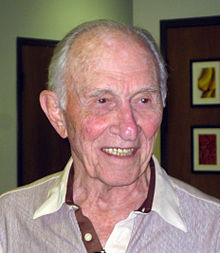Norman Farberow
| Norman Farberow | |
|---|---|

Farberow at Didi Hirsch Mental Health Services' Survivors After Suicide event in Culver City, California, June 27, 2009
|
|
| Born | Norman Louis Farberow February 12, 1918 Pittsburgh, Pennsylvania |
| Died |
September 10, 2015 (aged 97) Los Angeles, California |
| Nationality | American |
| Fields |
Psychology Suicidology |
| Alma mater | University of California, Los Angeles |
| Known for | A founding father of modern suicidology |
| Influences | Karl Menninger |
Norman Louis Farberow (February 12, 1918 – September 10, 2015) was an American psychologist, and one of the founding fathers of modern suicidology. He was among the three founders in 1958 of the Los Angeles Suicide Prevention Center, which became a base of research into the causes and prevention of suicide.
He was born in 1918 in Pittsburgh, Pennsylvania.
After completing his tour of duty in World War II, Farberow enrolled in the University of California, Los Angeles. UCLA’s doctoral program in psychology afforded Farberow an opportunity to study suicide against centuries of shifting attitudes. With few relevant references to draw upon for his 1949 dissertation, Farberow saw the potential for reawakening “interest in a long-neglected, taboo-encrusted social and personal phenomenon.” Farberow earned his doctoral degree from UCLA in 1950 while working with veterans in the Veterans Administration Mental Hygiene Clinic. He helped found the suicide prevention center along with Robert E. Litman.
Farberow served as a World War II Air Force Captain. The war years were a time in the United States of relatively low suicide rates, a wartime phenomenon commonly observed when a nation’s armed forces and citizens unite under feelings of common purpose and mutual goals.
In the decade after the war, suicide rates rose quickly as the sense of unity and shared purpose began to disappear. Wrenching social and personal readjustments were often needed, and these needs were further complicated by the emotional distress and mental health problems of returning veterans. Many expressed their deepening inner turmoil in unhealthy ways, through suicidal impulses and acts. Suicide’s continuing taboo, embedded in cultural and religious condemnations of shame, guilt, self-blame and cowardice, magnified an underlying sense of worthlessness and hopelessness.
Farberow saw the effects of these dynamics and how they compounded the misery of those who were suffering. His vision for solutions grew to include fundamental and humanitarian changes to the way in which communities treated the suicidal. Soon his time as a psychotherapist became eclipsed by his continuing research on suicide with Dr. Edwin Shneidman, a colleague equally passionate about changing the understanding and prevention of self-inflicted death.
...
Wikipedia
